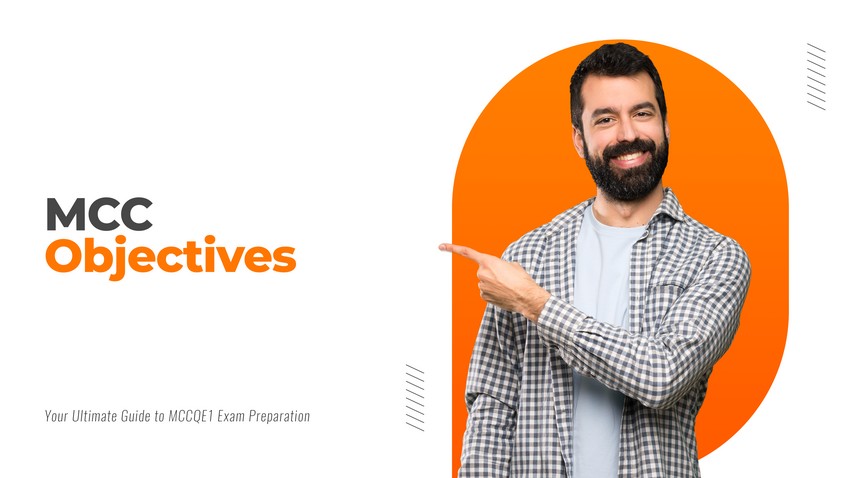MCCQE1| Leaving Disciplines Behind

- Understanding the MCCQE1 Landscape
- Disciplines for MCCQE Part 1
- The Temptation to Avoid Difficult Disciplines
- Ace QBank in MCCQE1 Exam Preparation
- Tailored Strategy for MCCQE Part 1
- The Role of Self-Assessments
- The Psychological Aspects of the MCCQE1 Prep
- Why is ignoring the Difficult Disciplines for MCCQE1 not an option?
- Key Takeaways
Stepping into the MCCQE1 domain feels a bit like being thrown into deep water and told to swim. You find out quickly that some disciplines feel like having floaties on, while others feel like wearing cement shoes. The allure of remaining within one’s comfort zone is undeniably strong. However, it is crucial to recognize that the Medical Council of Canada Qualifying Examination Part 1 transcends this notion and necessitates a dive into deeper waters for rigorous challenges. It’s more like an open water marathon, where you need to navigate through every discipline, easy or hard.
See, it’s easy to focus on the bits that come easy. Maybe you’re a whiz at diagnostics, or internal medicine makes perfect sense to you. But what about the stuff that makes your brain itch? Psychiatry, pediatrics, or whatever your personal bogeyman is, ignoring these subjects is like ignoring a toothache – it’ll only get worse with time. And in the MCCQE1, there’s nowhere to hide; those difficult disciplines will find you.
It’s understandable we all have our Achilles’ heels. The problem is the exam’s not just a test of knowledge. It’s a test of breadth and depth across the entire field of medicine. Skipping parts of it isn’t an option if you’re serious about wanting to practice medicine in Canada. In this blog, we are going to discuss How not to Ignore the tough stuff. Explore the Canadian resources that you can use to cover all the objectives and prove you are ready to take on whatever comes your way.
Understanding the MCCQE1 Landscape
The MCCQE1; think of it as the boss level in the game of becoming a doctor in Canada. This isn’t just any old test – it’s a comprehensive, clinical-oriented bash that covers everything from A-Z in medicine. Yeah, you heard that right.
Whether you are an experienced practitioner with years of medical practice in a foreign land, or you’re just beginning your journey fresh from local medical school. Your experience holds intrinsic value. This exam will evaluate your knowledge on a wide range of topics.
What makes it such a beast? Firstly, its scope. We are discussing an examination which has been meticulously tailored to identify those possessing the skills necessary for practicing medicine in Canada. This doesn’t simply involve a demonstration of theoretical knowledge – it encapsulates the application of such knowledge through clinical dexterity, decision-making capabilities and all other pertinent aspects related to medical practice.
And guess what? It doesn’t play favorites. International medical graduates and Canadian medical students alike have to prove their mettle.
Now, it’s not just about memorizing textbooks. This exam demands insight, physician-style. The MCCQE1 requires more than just academic prowess. It invites you to leverage your comprehensive clinical knowledge, the quick-thinking ability you’ve honed over time and the practical skills that set you apart. This is a moment for you to demonstrate not merely intellectual acuity. But also readiness in dealing with real-life situations where hard decisions have to be made.
And here’s a cherry on top. The scope of this examination provides a comprehensive assessment encompassing medical knowledge, clinical decision-making, ethics, and much more. It is thoughtfully designed to reassure not only your proficiency in medical facts but also your readiness to assume the duties associated with being a healthcare professional. Believe me when I say it’s an ambitious task. Yet, with diligent preparation and determination, success is well within your grasp.

Exam Format and Key Components
The Medical Council of Canada Qualifying Examination Part 1. It’s crucial to understand that this examination extends beyond being just an ordinary test. It is an extensive and multifaceted process aimed at thoroughly evaluating your knowledge base and decision-making capabilities under demanding circumstances.
Designed meticulously in two separate sections – multiple-choice questions (MCQs) and Clinical Decision Making (CDM) elements, this exam not only speaks about your academic prowess but also reflects on how you fare practically. The MCQ section acts as the backbone of your assessment, spanning various fields such as diagnosis methods and strategizing treatments.
On the other hand, the CDM component is designed to evaluate how efficiently you can navigate through authentic clinical situations demanding essential medical decisions.
Both sections are integral towards one’s success in this exam, thereby inching you closer towards becoming an esteemed member authorized to practice medicine in Canada. It isn’t merely about grasping medical theories or exhibiting competence in practical settings but excelling in both areas symbiotically that will help you succeed in MCCQE1.
As international graduates from different medical schools aspiring to join Canadian medical practices, I recognize that many of you dedicate countless hours preparing for the MCCQE1 exam- every step bringing you closer towards realizing your dreams. Therefore understanding each facet of this exam structure becomes pivotal allowing well-directed preparations ahead.
As of now, through to April 2025, the MCCQE1 will maintain its current format. This means it will be expecting your diligent responses on a total of 210 MCQs and much-considered decisions towards 38 CDM cases.
The Multiple Choice Questions(MCQs) are meticulously designed to evaluate your grasp over diverse medical scenarios, filtering through various aspects of medicine which have been part of your comprehensive medical school training. It is indeed an opportunity for you to express the knowledge application strength in practical situations while solving problems.
On the contrary, our Clinical Decision Making (CDM) segment assesses how wisely you make clinical decisions. Each case springs up with its unique clinical scenario compelling decisive actions from your side related to diagnosis, investigation procedures and effective management approach for patient treatment. To align with real-world medical scenarios, this segment critically examines your preparedness levels before entering any Canadian residency program.
Lastly yet importantly remember that irrespective nameable global differences in providing medical education systems worldwide – MCCQE1 exam retains standardization criteria equally applicable for all examinees globally. Emphasizing more if are themselves international students or professionals graduated from global medical schools – it holds paramount importance that they acquaint self thoroughly with style & intrinsic subject matter content-wise focus area settings within exams typically observed by Canadian Medical Schools examination methods.
This familiarity not only instills confidence but also enhances chances manifold ensuring high scoring prospective opportunities making way ahead during approaching MCCQE1 exam times!

The Role of MCC Objectives in Shaping Your Study Plan
Alright, here’s the scoop on the MCC Objectives – they’re like the breadcrumbs that lead you through the forest of study materials out there. These babies are not just random points; they’re your roadmap, guiding you through what you need to know to not only pass the Medical Council of Canada Qualifying Examination but to ace it. It’s like having the secret recipe to the exam; follow it, and you’re golden.
Now, why do these objectives matter so much? Because they lay out exactly what you need to cover – leaving no stone unturned. Proper coverage of these objectives is like having a master key; it opens the doors to understanding every aspect necessary for the MCCQE1 exam preparation. Remember, this isn’t just about memorizing facts. It’s about grasping the concepts deeply, so you’re ready for anything the exam throws at you.
However, covering all of these objectives – that’s the tough part. There are numerous objectives to cover, and truthfully speaking, every moment is valuable. Think you can skate by without paying them much mind? Think again. Not properly understanding and covering these objectives is like trying to drive without a map – you’ll end up lost. And in the high stakes world of medical licensing exams, getting lost isn’t an option.
So, at this point, you might be wondering, if the objectives set by the MCC are so important and the list is not short, how are you going to effectively cover all the objectives? Well, I have an answer for you in the next section.
In the following section, I will introduce a Canadian platform that is designed based on the objectives. The platform that helps you navigate through these objectives.

Incorporating Objectives Effectively
Covering these MCC Objectives might sound like climbing Everest in flip-flops, but it’s more doable than you think. The trick? Break it down and take it step by step. Leveraging strategic commitment and apt resources such as Ace QBank, crafted specifically to mirror the expectations of the Medical Council of Canada, will position you strongly on the path to success.
This journey isn’t merely about testing waters but embracing a comprehensive understanding of every objective. The goal is achieving a holistic grasp that ensures your mastery over each aspect.
Think of Ace QBank as your trusty sidekick in this adventure. Aligning their questions with the MCC objectives, they ensure you meet all essential prerequisites for comprehensive success on your exam day. This approach surpasses mere checklist completion; it fosters a profound understanding of the subject matter. Thus, when you enter that prometric centre, you can confidently confront and effectively tackle any unexpected challenges.
The question bank offers 2,700 high-yield questions with recent updates and over 140 top-notch CDM cases. All are designed based on the MCC objectives and facilitate preparation for the MCCQE1 exam. This isn’t just another question bank; it’s your secret weapon for exam success. Each question comes with an explanation, delving deep into evidence-based medicine to ensure you are not just memorizing answers but truly understanding the reasoning behind them.
But it doesn’t stop there. What sets this qbank apart is its unparalleled approach to making complex medical concepts more approachable. Accompanying the detailed explanations, you’ll find summary tables and flowcharts, ingeniously designed to break down complex medical concepts into digestible, easy-to-understand pieces. These tools are not just aids; they are your roadmap to mastering challenging material.
And we haven’t even touched on the custom illustrations yet. These aren’t mere decorations. They are carefully crafted visual aids designed to enhance your recall.
With two MCCQE1 self-assessments, you can gauge your progress, pinpoint areas of weakness, and tailor your study plan to ensure peak performance when exam day arrives. This isn’t just a question bank that has covered all the objectives. It’s a dynamic, evolving tool designed to elevate your learning experience and boost your exam performance.
We at Ace QBank believe, leaving any stone unturned isn’t just risky. It’s a gamble you don’t want to make. when it comes to MCCQE1.

Disciplines for MCCQE Part 1
Each field within medicine is genuinely termed as a discipline, and every further subdivision of these fields is referred to as a category in the context of examination. For example, Internal Medicine stands respectfully as a distinct medical discipline with its own set of eleven subcategories inclusive of compelling specialties like Cardiology, Neurology and Hematology among others.
The Medical Council of Canada conscientiously assigns specific objectives for each discipline or category, which are essential to consider. Paying close attention and thoroughly studying these objectives substantially elevates the likelihood of excelling in the examination.
This is primarily due to the fact that each question and clinically oriented scenario presented in the exam has been meticulously crafted with these MCC objectives at its core.
Ace QBank comprehensively encompasses all disciplines and 21 distinct categories. Notably, it is meticulously designed in line with the MCC objectives, adhering scrupulously to the CaMEDS framework, making it an exceptional tool for diligent learners.
How many disciplines are in MCCQE1?
The Qualifying Examination Part 1 conducted by the Medical Council of Canada encompasses an extensive set of eight key disciplines. These disciplines, pivotal for evaluating medical expertise and acumen, comprise:
- – Internal Medicine
- – Obstetrics & Gynecology
- – Psychiatry
- – Surgery
- – Pediatrics
- – Ethics in Medical Practice
- – Preventive Medicine
- – Emergency Medicine
Together, these discrete areas deliver a broad appraisal of a candidate’s medical comprehension across various critical sectors of practice.
How many categories are in MCCQE part 1?
The Medical Council of Canada (MCC) has made changes and improvements, to the exam over the decade. Currently the exam covers 21 categories. This may change in the future.
It’s worth noting that these adjustments focus on the exam content rather than its structure.
The exam evaluates the knowledge and abilities of graduates aiming to practice in Canada. It encompasses a variety of specialties and areas to confirm that candidates have the skills to deliver safe and high quality healthcare.
As medical knowledge and practices progress, the MCC consistently. Revises the exam content to keep pace with these advancements. This guarantees that the exam stays relevant and assesses candidates capabilities to address healthcare requirements effectively.
The MCC shares these changes with students and graduates through its website and other platforms. Candidates getting ready for the exam are encouraged to stay informed, about the updates and guidelines provided by the MCC for preparedness.

The Temptation to Avoid Difficult Disciplines
Now, let’s address the unavoidable topic at hand. Those sections you’d rather not touch with a ten-foot pole. Be it psychiatry, pediatrics, or some other daunting area, the temptation is real. For international medical graduates, it might be stepping out of their comfort zone, while domestic students could be wrestling with time constraints or simply a fear of the unknown.
But here’s the kicker: Ace QBank has this neat trick up its sleeve. It’s cooked up a banquet of high-yield questions that not only taste good but are good for you. These aren’t your run-of-the-mill questions; they’re crafted based on the objectives, sprinkled with a dash of evidence-based medicine for seasoning. Tackling these questions is like having a personal trainer for your brain, customizing your workout to tackle those muscles you didn’t even know you had.
The thing is each discipline no matter how formidable it seems is a piece of the puzzle. And in the grand scheme of the MCCQE1, missing pieces just won’t do. The beauty of Ace QBank’s approach is that it doesn’t let you skate by on the easy stuff; it pushes you into the deep end (with floaties, of course), ensuring you’re well-rounded and ready for anything the exam – and, ultimately, the practice of medicine in Canada – throws at you.
So, yeah, facing those difficult disciplines head-on might feel like going into a boxing match with one hand tied behind your back. But remember, you’ve got Ace QBank in your corner, whispering those sweet nothings of knowledge into your ear. Before you know it, those daunting sections become familiar friends, and passing the MCCQE1? Well, that becomes not just a possibility, but an expectation.
I believe active learning is a crucial method for breaking the ice and propelling your understanding forward, particularly in challenging disciplines and categories. The beauty of the question bank lies in its offering of two study modes. Specifically, the tutor mode is designed to help you navigate and thoroughly understand these complex areas.
You are not just passively absorbing information by leveraging active learning. You are engaging with information, questioning it, and applying it. This approach not only makes your study sessions more effective but also ensures you cover all necessary objectives related to the discipline and categories in question comprehensively.
In the end what it boils down to is this. The MCCQE1 is your Everest and those difficult disciplines are the steep slopes you need to conquer. Sure it is tempting to stick to the well-trodden paths. But it is the tricky climbs that test what you’re truly made of. Ace QBank’s got your back, but it’s up to you to make the climb. And let me tell you, the view from the top? It’s worth every step.

The Consequences of Avoiding Disciplines
Let me tell you, overlooking challenging portions of the MCCQE1 is comparable to attempting to bake a cake without first preheating the oven. It simply won’t yield optimal results. Neglecting certain disciplines while preparing for the MCCQE1 can actually predispose you to additional difficulties on your journey.
First off, each discipline covered in the exam is there for a reason, reflecting key aspects of medical knowledge and patient care you’re expected to handle. Ignoring them? Well, that’s like ignoring warning signs on a hike—you’re bound to get lost.
Think about it. The MCCQE1 is designed to assess your readiness to enter residency, focusing on a broad spectrum of medical knowledge, including those difficult disciplines you might be tempted to skip. Forgetting to cover all your bases means you might waltz right into the actual exam and find yourself face-to-face with questions you can’t answer. It’s not just about passing or failing. It’s about building a solid foundation for your future medical practice.
Moreover, avoiding these disciplines can lead to gaps in your clinical knowledge, potentially affecting patient care down the road. Imagine trying to solve a puzzle but missing some of the pieces. It doesn’t matter how good you are with the pieces you have; that puzzle isn’t getting completed without all of them. Similarly, comprehensive care depends on a well-rounded understanding of medicine, something the MCCQE1 tests for explicitly.
And let’s not forget the psychological impact of knowing you’ve dodged entire sections of your preparation. Heading into the exam with that hanging over your head is like trying to run a race with weights on your ankles. You are setting yourself up for unnecessary anxiety and a hit to your confidence. Both of which can drastically affect your performance on exam day.
Nevertheless, it is only human nature that we are drawn to what feels safe and sure. Play it safe and focus on the disciplines and categories you’re comfortable with. Avoid topics that seem more complex or less engaging altogether. However, this approach can have significant repercussions on both your exam results and your future medical practice.
The MCCQE1 is meticulously crafted to evaluate your proficiency in the application of medical knowledge. Development of clinical skills and demonstration of professional behaviours. These competencies are critically assessed against the standards requisite for catering to Canada’s diverse healthcare requirements.
It’s imperative not to overlook any topics while studying as this could create substantial gaps in your understanding. Such voids can diminish your performance on the exam significantly. Moreover, these deficiencies may persist into your residency period and possibly influence your future practice, posing potential threats to quality patient care.
Consider this: medicine is an integrative field. Each system, each process is interconnected. By neglecting certain areas, you might miss out on understanding these crucial connections, leading to a fragmented view of patient care. For instance, avoiding psychiatry because you’re more interested in surgery can overlook the importance of mental health in postoperative recovery. Similarly, overlooking the basics of pediatrics could hinder your ability to provide comprehensive family medicine.
Consequences of Leaving Disciplines Behind | |
Psychological | Academic |
Increase Anxiety Lower Confidence Increase Uncertainty Increased Exam Stress | Inadequate Preparation Poor Time Management Inability to Identify Weaknesses Reduced Performance on Exam Day |
In addition to these academic and professional consequences, there’s also the matter of personal integrity and duty.
As aspiring doctors, it is essential to remember the immense responsibility you bear towards your patients. Offering comprehensive and informed medical care should always be a priority. Preparing intensively for your exams is not merely about passing but rather laying solid groundwork in understanding the full scope of information that aids in exemplary patient care. Dedication towards this cause symbolizes more than just academic mastery but also signifies your readiness to fully embrace all facets of knowledge instrumental for ensuring outstanding healthcare..
I passionately encourage you not to shy away from the demanding subjects. View them as avenues for personal development and a stepping stone towards your MCCQE1 preparation, while paving way for a gratifying profession in medicine. It’s essential to remember, that our ultimate aim extends beyond merely earning the title of “Doctor”. Rather, we strive to embody proficient and empathetic physicians who possess the power to positively impact our patient’s lives.
It seems we may have strayed slightly from our main topic. Allow me to refocus and respond to the main question: What Are the Consequences of Avoiding Discipline?
In short, ignoring the difficult disciplines for the MCCQE1 doesn’t just increase the likelihood of failing; it undermines the very essence of your medical training. Like missing puzzle pieces, the gaps in your knowledge can prevent you from seeing the bigger picture, affecting not just an exam score but your future capacity to provide comprehensive patient care. Trust me, tackling these challenges head-on is the only way to go.

Stepping into the MCCQE1 ring without Ace QBank in your corner is like heading into a hockey game without a stick. Sure, you might have the moves, but you’re not going to score any goals. The qbank has earned its stripes by being meticulously tailored to the objectives of the MCCQE Part 1. With its questions and CDM cases reflecting MCC objectives and the CanMEDS roles, it’s a resource that’s in touch with the pulse of the exam. Constant updates keep it sharp and on point, so you’re always training with the latest info.
At this moment, I’d like to warmly remind you about the recent update of the question bank for this month. We’ve just added more than a hundred high-yield questions, each intended to enrich your learning experience. For our valued subscribers, you should have already received a detailed description of what’s new in the latest update. If this is not the case, please contact the support.
Considering the vastness of the medical field, it’s comforting to find a question bank that narrows down the ocean of potential study material to the essentials needed for success in the MCCQE1. This isn’t about stuffing your head with every fact under the sun; it’s about strategic preparation focused on what’s expected. Ace QBank shines here, offering a blend of questions designed to make you exam-ready.
Then there’s the advantage of self-assessment. Knowing where you stand is crucial, and the qbank serves up this reality check with its self-assessment tools. It’s not just about practicing questions; it’s about understanding your performance, drilling down into weaknesses, and turning them into strengths before you face the actual exam.
The fear of starting with a question bank can be real, especially when myths abound about needing to cover all bases before diving in. But waiting to feel “prepared” is a trap. Ace QBank is built to guide you through the MCCQE1 landscape from the get-go, making it your best ally for not just surviving but thriving in the exam prep jungle.

Maximizing the Use of Ace QBank for MCCQE1
Tapping into the full potential of Ace QBank for your MCCQE1 exam prep is like finding the optimal route through a maze. With more than 2700 high-yield questions and over 140 top-notch CDM cases at your fingertips, the resource is a goldmine. But success doesn’t come from just knowing it’s there; it’s about how you use it. The QBank doesn’t only cover objectives; it sets you up for success by honing your test-taking strategies and clinical judgment.
Starting early can’t be emphasized enough. Hitting the books might feel comforting, but nothing beats the nuanced understanding you develop when you directly tackle questions modelled on the MCC objectives. The question bank is designed to mirror the challenges of the actual exam, making early and consistent use of a strategy that sharpens both your knowledge and your ability to apply it under exam conditions.
Among its treasures are the two self-assessments tailored to give you a clear snapshot of your readiness. These aren’t just any practice tests; they’re gauges to measure how your actual exam might unfold, allowing for focused revisions where it truly matters.
Lastly, underestimating the value of starting with a qbank in preparing for the MCCQE1 is a common pitfall. Besides the direct benefits for your exam performance, engaging with Ace QBank early in your study process cultivates a familiarization with the format and demands of the test, paving the way for a more confident and competent approach when D-day arrives.
Exploring the Variety of Study Modes
Diving into Ace QBank reveals it’s more than a one-trick pony, especially with its thoughtful study modes tailored to different stages of preparation. Time mode is your go-to when you’re looking to simulate the real deal, helping you get a grip on pacing and endurance – key players in ensuring you don’t fold under the actual exam’s time constraints.
Tutor mode, on the other hand, is like having a wise coach by your side, guiding you through the rough terrains of challenging disciplines. This mode allows you to tackle tough questions with immediate feedback, turning daunting topics into manageable lessons. It’s an approach that nurtures confidence and deepens understanding, piece by piece.

Thorough understanding of Explanations
Ace QBank doesn’t just test; it teaches. The explanations for each question are crafted with an eye toward illuminating the underlying principles, aligned with MCC objectives and relevant to the MCCQE Part 1 exam. It’s about turning “I don’t get it” into “Ah, now I see why” moments, propelling your test-taking skills to another level.
Dealing with questions in the qbank is a two-pronged process: you challenge your understanding and then dive deep into the explanation, regardless of whether you got it right or wrong. This method ensures not just correction of mistakes, but reinforcement of correct reasoning paths, effectively solidifying your preparation foundation.
By meticulously going through these explanations, you’re doing more than studying; you’re engaging in a form of active learning that is critical for success in the MCCQE Part 1 exam. Each explanation is a mini-lecture, distilled into digestible insights that enhance both your knowledge base and your ability to apply that knowledge in a clinical context.

Creating Question Blocks from Wrong Answers
One of the clever strategies with Ace QBank involves turning your mistakes into a tailored study session. By creating question blocks from the answers you got wrong, you’re essentially focusing your revision on weak spots, transforming them into areas of strength. It’s like rounding up all the troublemakers and dealing with them head-on, ensuring they won’t cause trouble again.
This approach not only enhances your learning but also serves as a reality check on your preparation levels. Facing your mistakes directly, understanding why they happened, and drilling on those specific areas is a proven technique to boost your overall performance. It’s about turning setbacks into set-ups for future success.
Moreover, this focused strategy mirrors the adaptive learning principles, where your study path dynamically adjusts based on your performance. Regularly revisiting these question blocks sharpens your recall and understanding, ensuring that when you face similar challenges in the actual exam, you’ll tackle them with confidence and precision. It’s about building a more resilient and well-prepared version of yourself, ready to face the MCCQE1 head-on.

Tailored Strategy for MCCQE Part 1
Preparation for the exam does not require much of a strategy. But medical schools in Canada are demanding, and frequent absences will get you in trouble. So, you need to utilize a study plan to optimize your preparation.
Creating a study plan helps you to prioritize your studying. Dedicate sufficient time for comprehensive study and actively engage with questions in Ace QBank. Active engagement is the other word for “integrate practice questions and clinical cases” into your study routine. It will greatly enhance your problem solving, critical thinking and boost readiness for the exam to meet the competencies expected.
Healthcare professionals from abroad should remember the CanMEDs framework is important, and the MCC objectives is essential. Ace QBank is based on the MCC objectives and in accordance with the CanMEDs framework. But the best part about the question bank is that the objectives are regularly updated.
The qbank is a valuable resource that has helped many healthcare professionals to enter residency programs. Most certainly, your case is no different.

Setting a Realistic Study plan
Let me tell you. Diving into the MCCQE Part 1 without a solid study plan. It is similar to trying to bake a cake without any recipe in hand. It could turn out great, or you might just end up with a mess.
To avoid the latter, I recommend breaking down your prep into digestible pieces. Think about the vast objectives as ingredients that need careful measuring. Allocate time for each discipline based on your comfort level with it. The tricky bits might need more of your time, while the topics you’re cozy with can get by with less.
Flexibility is your friend here. Life is journey is indeed full of surprises. At one moment, you might find yourself enveloped by an abundance of time, and in the next instance. You could be overwhelmed with tasks. This calls for a flexible study plan that adjusts to your ever-changing circumstances. Always remember: The aim is to comprehensively conquer your curriculum without pushing yourself to exhaustion.
Stick to your study materials like they’re your compass. They’ll guide you through the wilderness of topics ensuring you don’t lost in the bushes of procrastination or confusion.
Remember, study groups can be a lifeline, especially when you’re sinking in the quicksand of complex concepts. Sharing perspectives with peers can shine a light on those ‘Aha!’ moments you’ve been chasing solo. Making use of various study aids, including flashcards, visual aids, and practice questions, can also bring variety to your study routine, keeping boredom at the bay.
Lastly, don’t forget to sprinkle some self-care into your study routine. Marathon study sessions can burn you out faster than a cheap candle. Regular breaks, a bit of exercise, and adequate sleep are not just good for your health; they’re essential for retaining what you study. Think of it as letting the knowledge stew in your brain overnight, so it’s perfectly seasoned by exam day.

Tips for MCQs Part
Now, onto the meat and potatoes of dominating the MCCQE Part 1. First off, preventive medicine isn’t just for patients; it’s for medical graduates too. Steer clear of last-minute cramming; it’s the academic equivalent of a diet pill – promises a lot but delivers little. Prioritizing topics that you find challenging is crucial. Highlighting the essential elements within each objectives can help you spot patterns and make connections, turning the complex into manageable bites.
Next up, practice makes perfect. Tackling 210 multiple-choice questions isn’t a stroll in the park. It’s more like a marathon where endurance matters. Regularly practicing sample questions can build that stamina, getting you comfortable with the exam format and time constraints. Dive into the questions with an analytical mind, dissecting each one to understand why each answer is correct or not.
The preparation process for the MCCQE Part 1 is like training to be a physician in Canada. It is rigorous and demanding but it’s also rewarding. Each study effort you make polishes your clinical skills, critical thinking, and ability to make differential diagnoses. These are the core competencies of Canadian physicians, and acing this exam is your first step towards joining their ranks.
Last but not least, the MCC objectives. Remember that the quest to practice in Canada is paved with challenges and triumphs. Embracing the exam objectives fully prepares you not just for the MCCQE Part 1 but for the broader journey of becoming a licentiate of the medical council. Success lies in understanding that it’s not just about passing an exam; it’s about building the foundation of your future practice.

Practical Advice for CDM Part Success
In the battle against the CDM part of the MCCQE Part 1, strategy is everything. This isn’t just about knowing your stuff; it’s about applying it. The key here is to approach each case scenario with a clear head and a structured method. Start by carefully reading the scenario, ensuring you fully grasp the patient’s story and the clinical signs presented. This is where your clinical skills shine, allowing you to sift through the information to identify what’s relevant.
Develop a methodical approach for your differential diagnosis. It’s like being a detective. You are piecing together clues to solve the puzzle. Your ability to prioritize potential diagnoses based on probability and severity is what will set you apart. Remember, this part of the exam tests your clinical judgment, so trust your training and instincts.
It’s crucial to carefully read the vignettes and questions, as they contain information essential for formulating your answers (specific instructions). Your responses should reflect both your clinical reasoning skills and your ability to prioritize tasks in a real-world setting. Remember, this part of the exam tests not just what you know. But how you use that knowledge to make informed clinical decisions.
Proper time management can’t be overstated With the clock ticking. You have got to allocate your minutes wisely. Some cases will be straightforward, asking for quick decisions in an emergency room setting, while others will require more contemplation. The trick is not to get bogged down by any single question. Give each case the attention it deserves, but keep moving.
Lastly, focus on your patient management skills. Decisions in CDM cases often involve choosing appropriate diagnostic tests, treatments, or understanding when a referral is needed. Think about safety, cost-effectiveness, and the patient’s best interest. Practicing these scenarios beforehand can demystify the process and help you develop confidence. Patient-centred approach to clinical problems.

The Role of Self-Assessments
In preparing for the MCCQE1. Self-assessments serve like a mirror, providing clear reflections of your strong areas as well as those you need to work on. Leveraging these assessments means aligning your study endeavours with the authentic exam structure, guaranteeing that no aspect is overlooked. These assessments, crafted with the MCCQE Part 1 exam in mind, include high-yield questions that are the essence of what you need to focus on.
We know the drill: study hard, cover all bases, and pray you remember everything. But it’s one thing to read through the Canadian Medical Education Directions for Specialists (CanMEDS) roles. It’s another to understand how these roles play out in real-world scenarios. Self-assessments allow you to see which MCC objectives might need more attention, guiding you to tailor your preparation effectively.
The self-assessment questions aren’t just any questions. They’re curated by experts to closely simulate the experience of the actual exam.
One of the golden rules of using these self-assessment tools is to accurately assess your readiness. The questions in these assessments are not a repeat of what you’ve already tackled in the question bank. Fresh questions present new challenges, pushing your understanding further and uncovering gaps you might not have realized existed.
Understanding the outcomes of these personal evaluations requires a certain caliber of discernment. It’s not simply about tallying up your points; it deeply involves grasping why some responses were wide of the mark and seeking ways to fill those learning voids. This reflective practice is what transforms a good candidate into a great one. Use this opportunity and turn your weaknesses into strengths before taking the exam.

Interpreting Self-Assessment Results for Focused Study
Scoring above 80% on self-assessments? Give yourself a pat on the back, but don’t ease off the gas entirely. Comfort zones are lovely, but the MCCQE Part 1 exam can throw curveballs. For those landing between 60% and 80%, it’s crunch time; your study strategy needs a revamp. Below 60%? Don’t panic; it’s redemption time, not defeat. The goal is clear: optimize your study schedule for a turnaround.
For those in the 60-80% bracket, hone in on those medium scores. These are your gold mines for improvement. Dive deep into each question, especially those from your weaker areas, to understand the nuances and logic behind each answer. This approach not only enhances recall but strengthens decision-making skills crucial for the real deal.
Below 60%, it’s tempting to consider cramming, but resist the urge. Instead, meticulous and systematic study is your ally. Cluster your weaknesses and attack them one at a time, integrating high-yield questions into your routine. Your preparation strategy must include a diverse set of resources, making Ace Qbank explanations a cornerstone of your study plan, thanks to their depth and clarity.
Importantly, track your progress. Creating question blocks from wrong answers and revisiting them regularly helps in cementing the knowledge. It’s about turning weak areas into fortresses, boosting your confidence step by step. The journey from uncertainty to assurance is paved with persistent, focused effort. Remember, every question you master now is one step closer to passing the exam.

The Psychological Aspects of the MCCQE1 Prep
Exam prep isn’t just about burying your nose in textbooks or solving endless questions. It’s a mental marathon, and each of us carries our own set of worries. The looming thought – “What if the exam focuses on my weakest spot?” – can cloud even the brightest mind. Avoiding categories might seem like a shortcut, but it’s a gamble with high stakes.
To keep those nerves in check, a meticulously crafted study schedule becomes your blueprint for success. Ditching distractions is crucial. That phone buzzing with notifications? A siren call luring you away from your study island. Silence it, turn it off, do whatever it takes to keep your focus locked in. This isn’t just about discipline; it’s about building a fortress around your concentration, warding off any invaders.
Dedicating sections of your day exclusively to study, interspersed with breaks, constructs a rhythm to your preparation. It’s not about cramming till your brain is fried but pacing yourself to absorb, understand, and apply the material effectively. And remember, a flexible plan is a sturdy plan. Adapting to unforeseen challenges without losing stride is key to keeping stress at bay and maintaining a steady march towards your goal.
Make no mistake, the journey to tackling the MCCQE1 is demanding. But, integrating periods of rest and relaxation into your preparation strategy keeps the mind sharp and spirits buoyed. Envisioning the moment of triumph, passing the exam, becomes not just a distant dream, but an achievable reality. It’s about transforming stress into motivation, one study session at a time.
Nevertheless, covering all the objectives is not just about ticking boxes; it’s about building a foundation of confidence as solid as bedrock. The psychological comfort of knowing you have left no stone unturned is priceless. It minimizes exam day jitters and maximizes performance. So, buckle up, chart your course, and let’s conquer this beast with a well-prepared mind and an unbreakable spirit.

Positive Mindset for Exam Success
Truth be told, practicing medicine is far from simple. Instead, it presents itself as an intricate labyrinth that continually surprises and challenges us at each turn. Preparing for such a challenge requires not just brains, but a bucketload of positivity. Instead of dwelling on the difficulty, focusing on understanding the mechanisms and reviewing objectives with a can-do attitude can shift mountains of anxiety.
The thing about a positive mindset is it’s like a good medicine – it doesn’t remove the infection but helps the body fight it stronger. So, when you face medical concepts that twist your brain in knots, greet them with determination, not dread. This approach not only clears the fog but lightens the load, making the subjects more approachable and less intimidating.
Besides, walking into the MCCQE1 with a grin on your face might not answer the questions for you, but it sure makes taking the exam less of a chore and more of a challenge. It turns out, a positive outlook might just be the secret sauce to slaying the dragon of anxiety, paving the way for calm and collected problem-solving on exam day.

Why is ignoring the Difficult Disciplines for MCCQE1 not an option?
Wrapping it up, let’s lay it on the line: dodging the hard stuff won’t cut it. Medicine demands a breadth of knowledge as wide as it is deep, and the MCCQE Part 1 makes no exceptions. It’s like avoiding the gym then wondering why lifting groceries feels like a workout. The only way out is through—tackling those tough topics head-on.
Veering away from the tough cookies might seem tempting, but let’s be clear. It’s a no-go. The MCCQE Part 1 isn’t just any test. It’s the gatekeeper to your future in the field of medicine. Ignoring difficult disciplines is like trying to build a house while skipping the foundation—it just doesn’t stand. Medicine is a field that thrives on comprehensiveness; every questions, and clinical cases count.
Remember, every challenge faced in preparation is a lesson learned, not just for passing the exam but for medical practice itself. Medicine is a field of relentless inquiry and constant learning. Facing difficult disciplines head-on not only prepares you for the MCCQE Part 1 but molds you into a more competent, confident healthcare provider. So, let’s embrace the challenge. Fortify our resolve, and step into the arena with determination.

Turning Challenges into Opportunities for Growth
Facing the tough stuff head on in the MCCQE Part 1 might feel like trying to eat a bowl of soup with a fork. However, every challenge presents an opportunity for growth and learning. The struggle is undoubtedly disheartening, and it may even compel you to surrender. But here’s the bright side; such situations truly offer unbeatable avenues for personal development and growth.
Every time you stumble on a tough topic, it’s actually a chance to get smarter, to understand medicine on a deeper level. This ain’t just about passing an exam; it’s about becoming the kind of doctor that can tackle anything. Medicine’s full of curveballs, and mastering these difficult disciplines now means you’ll be more prepared for whatever comes flying at you later on.
Embracing the hard parts is like lifting weights for your brain. Each challenge you overcome not only preps you for the exam but lays down a solid foundation for your medical career. Think about it, the confidence you gain from mastering a topic that once seemed impossible is priceless. It’s not just about learning facts. It’s about developing a mindset that no obstacle is too big, no objectives too daunting. This attitude, rooted in facing difficulties head-on, turns would-be stumbling blocks into stepping stones for both your exams and your life as a physician.
Key Takeaways
Medicine is a field requiring comprehensive expertise, and your success on this exam is a testament to your potential to offer properly-rounded patient care. Avoiding difficult disciplines is, in reality, not an option; it’s counterproductive to the very essence of medical training and exercise.
The MCCQE Part 1 is more than just an examination; it’s an enormous milestone in your clinical adventure. Think of it as a gatekeeper that guarantees you’ve built a strong basis of medical is vital. Do not shy away from the difficult objectives—include them. The attempt you make to master those areas can pay dividends in your future profession.
Remember that each challenge you come upon while studying is making you ready for the realities of medical practice. When you face difficult objectives head-on, you are not simply increasing your chances of passing the exam but also honing your problem-solving abilities and enhancing your clinical knowledge. This preparation will make you a more positioned and assured health practitioner—one who’s well-ready to address the complexities and uncertainties of patient care.
Developing a mindset now, as you tackle these challenges. It will set the stage for your career as a physician. You are training to become a lifelong learner. Someone who views obstacles as opportunities to grow and improve. Mastering the material that seems daunting today will give you the confidence to face the unknowns of tomorrow with poise. Keep pushing forward, stay determined, and remember that the journey through medical education is as much about personal development as it is about acquiring knowledge.


